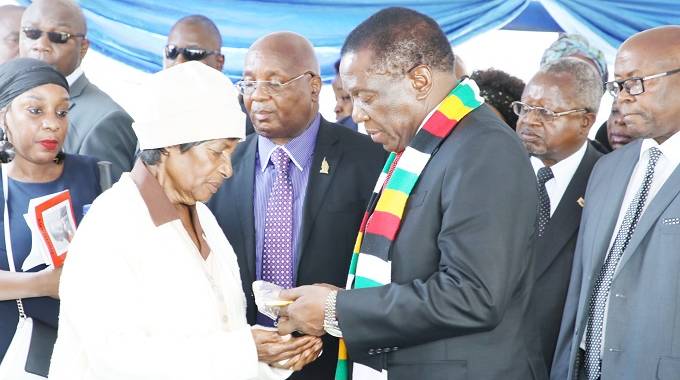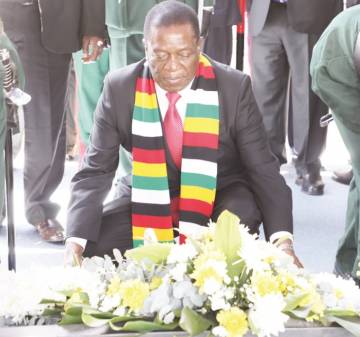Source: ED challenges youths. . . Use intellect, skills to spearhead development | Sunday News (local news)

Levi Mukarati, Harare Bureau
THE country’s youth should emulate the life of ingenious and innovative luminaries such as the late national hero, Professor Callistus Ndlovu to channel their creative prowess and innovation “to leapfrog the country’s industrialisation and modernisation agenda,” President Mnangagwa has said.
In his eulogy at the burial of Prof Ndlovu at the National Heroes Acre yesterday, President Mnangagwa also rallied the country’s tertiary institutions to produce “technopreneurs” to drive the Fourth Industrial Revolution, which leverages on emerging technological innovations to spur economic development.
The late liberation icon succumbed to pancreatic cancer at a South African health facility a fortnight ago.
He was 83.
“I challenge students and student leaders across the country to emulate the life-history of heroes such as the late Professor Ndlovu. Youthful ingenuity, creativity and innovation must be harnessed to drive our desire to leapfrog the country’s industrialisation and modernisation agenda. We are in a defining phase in our country’s economic history; hence, I call upon students throughout our institutions of higher learning not to be spectators in our country’s development epoch,” said President Mnangagwa.
“Academic intellect, scholarship and proximity to age-mates — which learning institutions provide — must be used to develop start-ups, innovation and products that give solutions to our development,” he said.
The new political administration, President Mnangagwa said, we will not brook “politics that engender violence”.
“Let us desist from engaging in divisive politics that work against the national interest and worsen the plight of our people.
“Politics that engender violence have no place in the new Zimbabwe. We condemn in strongest terms the actions by some hooligans with a wicked agenda, who went about attacking people in Harare South wearing Zanu-PF regalia and destroying their trading stalls and merchandise.
Destabilisation of the country through such political hooliganism is criminal, evil and barbaric. This will not be tolerated by my administration. Perpetrators of such criminal activities will be brought to book.”
He said Prof Ndlovu — who he described as an intellectual giant — was a consistent and persistent cadre who had high regard for the Zanu-PF Constitution.
“The principles of the party were always his beacon and he never decided matters to please personalities or one group against the other. He was a unifier and peace-maker. The hero we are bidding farewell today (yesterday) was an intellectual giant par excellence, an accomplished scholar, a progressive-minded person, an astute political cadre, a peace-maker and a man of substance,” said the President.
Prof Ndlovu, he added, was a “genuine nationalist”.

President Mnangagwa lays a wreath at the grave of late national hero Cde Callistus Ndlovu at the National Heroes Acre in Harare yesterday
“He has a rich history of service to the party and Government, which made him a fountain of knowledge and wisdom. His vast contribution benefited many generations and helped contribute to the transformation of our great nation. He was a genuine nationalist with unwavering dedication to national development . . . On behalf of the Government and people of Zimbabwe, the ruling party Zanu-PF and indeed on my own behalf, I want to convey my heartfelt condolences to Mrs Ndlovu, the children and entire Ndlovu family for their sad loss.”
President Mnangagwa said Prof Ndlovu grew up in a hostile and oppressive political environment that discriminated against blacks in favour of white settlers.
He said the late academic became a victim of discriminatory pieces of legislation such as the 1930 Land Apportionment Act, Land Husbandry Act of 1951 and later the Preventative Detention Act, which essentially banned political activities by Africans.
However, punitive legislation did not stop Prof Ndlovu from political activities as he joined the National Democratic Party in 1960. “He was subjected to periods of detention and was perceived, by the regime, as a bad influence. He became chairman of Zapu branch of students and residents in the early 60’s while he was a student at Pius XII University College in Lesotho. From 1963 to 1964, he was president of the Student Representative Council.
Between 1956 and 1964, he was secretary for publicity for the National Union for the Basutoland Students.”
President Mnangagwa challenged the nation to remain loyal and true to the country in the face of current challenges.
Prof Ndlovu was born on February 9 1936 in Plumtree, where he did his primary and secondary education before joining the National Democratic Party in 1960. He trained as a teacher before enrolling for a Bachelor of Arts degree at Pius XII University College in Lesotho. He became involved with Zapu in 1963 when he was a student in Lesotho.
On completing his degree, Cde Ndlovu came to Bulawayo and taught at Empandeni High School, before moving to Mafakela Government School. From 1966 to 1967, he taught at Mpopoma High School. As a teacher, he was detained in 1966 by the Rhodesian regime, which felt that his influence among African teachers was not good for the regime.
He was detained at Khami Prison in 1966 for promoting the objectives of the Zapu guerrillas and was released after 90 days.
He left the country in 1967 for New York University, where he did his Masters and PhD studies. During the course of his studies at New York University, Prof Ndlovu became very much involved with Zapu, and became the party’s chairperson in North America from 1967 to 1971. He set up an office near the United Nations.
This was quite an important office for Zapu because the party coordinated most of its external relations outside Africa, and the office in London, United Kingdom, depended on information from his office.
From 1971 to 1980, he was a member of the Revolutionary Council and represented the party at the United Nations and North America. Prof Ndlovu also attended the Geneva talks as a political advisor in the Zapu delegation in 1976, as well as the Lancaster House talks on Zimbabwe for the Zapu delegation.
In 2000, Prof Ndlovu was a member of the Constitutional Commission of Zimbabwe.
After independence, Prof Ndlovu was a Central Committee member from 1980 to 1983 and the Bulawayo provincial chairperson of the Zimbabwe African National Union (Zanu) from 1984 to 1987. He was a Member of Parliament from 1980 to 1985 and a Member of the Senate from 1985 to 1990. He worked as a director at Carbin Finance and the Group industrial relations manager at Union Carbide Corporation in the early 80s. In 1990, he was an executive consultant with the Treger Group of Companies and a member of the Joint Private Sector Standing Committee to promote trade between Zimbabwe and Botswana.
He also worked as the chief executive officer at Calding Consultants (Pvt) Limited in 1991. Prof Ndlovu was appointed the Minister of Construction between 1982 and 1983 before he was appointed the Minister of Mines from 1983 to 1984.
Between 1984 and 1989 he was the Minister of Industry and Commerce. He also worked for the Zimbabwe Institute of Public Administration and Management (Zipam) for several years. The late academic was once chairman of the Board of Directors at NetOne and chairman of the Foundation Task Force of the Gwanda State University. At the time of his death, Prof Ndlovu was a member of the Zanu-PF Central Committee and Bulawayo provincial chairman. He is survived by wife Angeline, several children and seven grandchildren.
The post ED challenges youths. . . Use intellect, skills to spearhead development appeared first on Zimbabwe Situation.